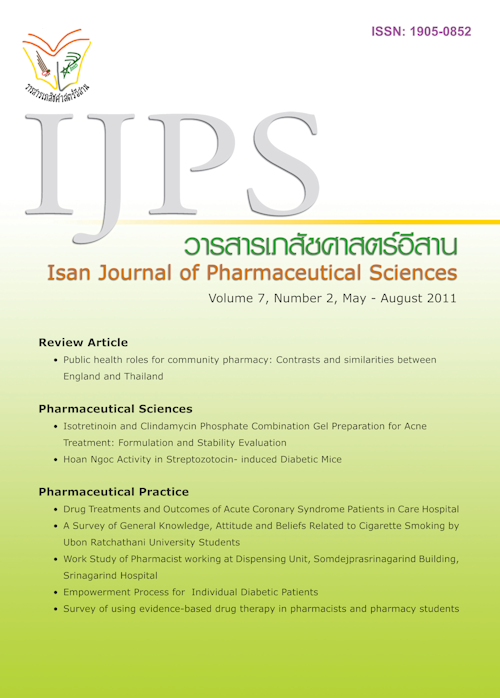Empowerment Process for Individual Diabetic Patients
Main Article Content
Abstract
Introduction: One to lack of existing research, this study explored steps and processes in empowerment development among individual diabetic patients with poor glycemic control, based on Gibson’s empowerment concept. Method: This participatory action research employed informal interviews in 10 purposively selected diabetic patients with poor glycemic control (hemoglobin A1c > 6.5%) who had been followed up at the diabetic clinic of Nongsaeng Community Hospital. Data were collected from December 2010 to February 2011. Content analysis of empowerment steps and their corresponding processes was used. Results: Empowerment steps and processes found in patients ready to change (n = 3) were similar to those who were not (n = 7) but with a shorter time to further the steps. Steps and processes found in individual patients were varied. Collectively, however, all four steps with their corresponding processes according to Gibson’s empowerment concept were found as follows: 1) “discovering reality” with processes of exploring the problem, seeking information, and perceiving the real problem, 2) “critical refection” with processes of defning strategies to solve the problem, telling their life-experience, and evaluating their problem-solving action, 3) “taking charge” with processes of identifying needs and psychosocial problems, and defning strategies to achieve self-selected goals, and 4) “holding on” with the process of getting and staying motivated. Conclusion: All stages and processes based on the empowerment development concept were found in diabetic patients with poor glycemic control, even though they varied among individual patients. When patients identifed their own concerns and gained the skills and confdence to act upon them, they could potentially solve their own health problems.
Article Details
In the case that some parts are used by others The author must Confirm that obtaining permission to use some of the original authors. And must attach evidence That the permission has been included
References
Aujoulat I, D’Hoore W, and Deccache A. Review Patient Empowerment in theory and Practice: Polysemy or cacophony. Patient Education and Counseling 2006; 66:13-21.
Boonyuen N. The Effect of Empowerment Process on Self-Care Behaviors and Levels of HemoglobinA1C in Elderly Diabetic [Master of Nursing Science thesis]. Phitsanulok: Naresuan University; 2006.
Bureau of Epidemiology, Department of Disease Control, Ministry of Public Health. Annual Epidermiological
surveillance Report 2008 [Online]. 2008 [cited 2011 May 15]. Available from: http://203.157.15.4/Annual/Annual%202551/Part1_51/Annual_MenuPart1_51.html
Funnell MM, Anderson RM. Empowerment and Self-Management of Diabetes. Clinical Diabetes 2004; 22(3): 123-127.
Gibson CH. The Process of Empowerment in mothers of chronically ill children. Journal of Advanced Nursing 1995; 21: 1201-1210.
Koyun S. Effects of Empowerment in Patients with Diabetes Melitus Type 2 and Their Families on Their Perception of Control in Illness Management [Master of Nursing Science thesis]. Khon Kaen: Khon Kaen University; 2007.
Mahawarakorn S. The Effectiveness of The Empowerment to Control Blood Sugar on Personal Self-Care with Diabetes Melitus Type 2, and Complication Patients, Udornthani Hospital, Udornthani Proviance [Master of Public Health thesis]. Khon Kaen: Khon Kaen University; 2008.
Praikheaw S. Effects of Empowerment Program at Home on Self-Esteem and Self-Efficacy in Diabetes Melitus Type 2 Aging patients and their Families [Master of Nursing Science thesis]. Khon Kaen: Khon Kaen University; 2009.
Siri T. Empowerment Program with Goal Setting for Type 2 Diabetes Patients’ Self-care Behaviors at Somdejprajoatksinmaharaj Hospital, Tak province [Master of Public Health thesis]. Nakonpathum: Mahidol University; 2008.
Teerapakorn S. Relationship between Fasting Plasma Glucose and HemoglobinA1c in Type 2 Diabetes Mellitus Patients Attending Ladlumkaew Hospital. Journal of Health Systems Research 2008; 2(1): 809-815.


